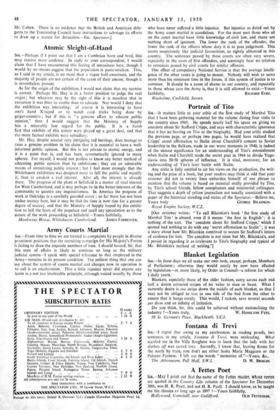Portrait of Tito
SIR,—It matters little to your critic of the trst study of Marshal Tito that I have been gathering material for the volume during four visits to the country since 1945. He spends nearly half his space on giving an anecdote about Sir Stafford Cripps, and says with characteristic ignorance that it has no bearing on Tito or the biography. Had your critic studied the previous page, or perhaps two pages, he would have realised that Cripps' secret affirmation to Stalin about Churchill's consent to Soviet leadership in the Balkans, made in our worst moments in 1940, is indeed of the utmost significance for an understanding of Tito's astonishment when Stalin and Churchill made the secret pact in 1944 to divide Yugo- slavia into 50-50 spheres of influence. It is vital, moreover, for an understanding of Tito's later battle with Stalin.
Any critic is fully entitled to air his views on the production, the writ- ing and the price of a book, but your readers may think it odd that your reviewer did not in twenty lines unburden himself of one phrase to mention that the volume is based on material orally provided by Tito, by Tito's school friends, fellow conspirators and ministerial colleagues. That suggests a depth of yellow journalism not usually associated with a paper of the historical standing and status of the Spectator.—Believe me,
[Our reviewer writes: "To call Bilainkin's book the first study of Marshal Tito' is absurd, even if it means 'the first in English ': it is nothing of the sort. The anecdote about Sir Stafford Cripps,' which I quoted had nothing to do with any secret affirmation to Stalin ' ; it was a story about how Mr. Bilainkin contrived to secure Sir Stafford's letters of credence for him. The anecdote is not mine but Mr. Bilainkin's, and I persist in regarding it as irrelevant to Tito's biography and typical of Mr. Bilainkin's method of writing."]






























 Previous page
Previous page